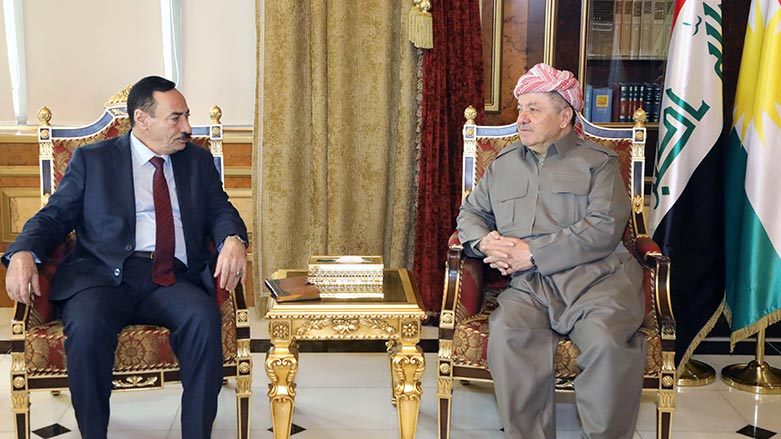Kurdish leader, governor of Iraq's Nineveh discuss security, displacement

ERBIL (Kurdistan 24) – Senior Kurdish leader Masoud Barzani met on Tuesday with Najim al-Jabouri, the governor of Iraq's embattled Nineveh province, to discuss a range of issues concerning major impediments to security and reconstruction in areas liberated over two years ago from the grips of the so-called Islamic State.
The gathering took place in the private Erbil office of Barzani, the leader of the Kurdistan Democratic Party (KDP). Jabouri, who was recently voted Nineveh's provincial governor, had an accompanying delegation from the local administration with him.
The two leaders discussed the general situation in Nineveh, with a focus on security concerns in the city of Mosul and surrounding areas, a statement from Barzani's office said. They also covered ongoing difficulties with rebuilding liberated areas and the obstacles that prevent their former residents, displaced by conflict, from returning home.
In an interview with Kurdistan 24 in late December, Jabouri stated that reconstruction projects in parts of Nineveh were due to begin in early 2020. He added that seven billion Iraqi dinars (just under $5.88 million) had been earmarked for one project aiming to rebuild the main transportation routes connecting the majority Yezidi (Ezidi) city of Sinjar (Shingal) with its sacred shrines, temples, and the rest of Nineveh.
Read More: Reconstruction project in Shingal will begin in the New Year: Nineveh Governor
Barzani and Jabouri spoke about the enduring threat posed by Islamic State militants to Iraq and the Kurdistan Region, plus the dire need for coordination between the two to prevent the terrorist organization's re-emergence.
Governor Jabouri has also previously told Kurdistan 24 that, in parts of Nineveh, “permanent coordination between the Peshmerga and Iraqi forces” has been established to track and confront sleeper cells of the Islamic State.
Read More: 'Permanent coordination' between Iraqi, Kurdish forces in Nineveh: Governor
Security coordination between Erbil and Baghdad broke down after Iraqi forces and Iranian-backed militias took over much of the areas disputed between the two governments in response to the Kurdistan Region’s September 2017 independence referendum, pushing Kurdish Peshmerga forces from them.
Since then, Islamic State fighters have taken advantage of the security void in areas between territory protected by Iraqi and Peshmerga troops, which sometimes reaches up to 20 kilometers deep. The rugged, barren terrain in many such areas been a haven for militants who use it as a base from which to plan and launch attacks in surrounding settlements and towns.
Officials from Kurdistan, along with civilians in the disputed territories, have often called for a long-term joint security plan between Erbil and Baghdad as the only effective solution to countering the extremist group's activity.
Editing by John J. Catherine
